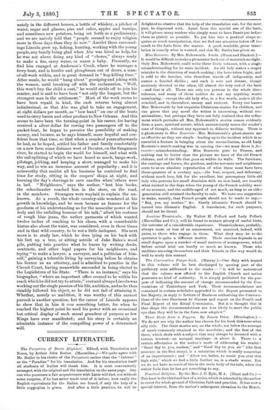Miss Rouverie. By Mrs. Molesworth. 3 vols. (Hurst and Blackett.)—
It would be difficult to make a pleasanter book out of materials so alight. Only Mrs. Molesworth could write three lively volumes, with a single misunderstanding for its main incident. An old lady makes a stupid mistake in the direction of match-making ; the hero takes fright, and is cold to the heroine, who therefore stands off indignantly, and nurses a fancied dislike ; and each is sore and distant, though anxiously devoted to the other, till almost the very end of the hook --and that is all. There are only ten persons in the whole three volumes, and many of these neither do nor say anything worth mentioning,—except the old lady who, in a few words, makes all the mischief, and is, thereafter, uneasy and reticent. Every one knows Mrs. Molesworth by her exquisite Christmas stories for children, and can guess that any novel she writes is interesting, without sen- sationalism; but perhaps they have not fully realised that the refine- ment which pervades all Mrs. Molesworth's stories comes evidently from a pure, spiritual nature, which unconsciously raises the reader's tone of thought, without any approach to didactic writing. There is a ghost-story in Miss Bouverie—Mrs. Molesworth's ghost-stories are as effective as they are simple—leading up to the incident which is as essential a feature in bringing about the reconciliation, as old Lady Bouverio's match-making was in causing the—we must deem it for- tunate—misunderstanding. Miss Bouverie goes to France, and nothing can be better than the picture we have of the old French chiteau, and of the life that goes on within its walls. The furniture, the carriage and horses, the gardens, and the servants and neighbours seem to us an absolute reproduction of what these must have been three-quarters of a century ago,—the fear, respect, and deference, without much love, felt for the excellent, but peremptory little old lady who governs her small dominion with an iron hand, are exactly what existed in the days when the young of the French nobility were of no account, and the middle-aged of not much, as long as an older generation still retained the faculty to rule. We have one suggestion to make, namely, that French people should not be made to say,— " But, yes, my mother," &a. Surely idiomatic French should be turned into idiomatic English. A translation, for such purposes, should not be literal.


































 Previous page
Previous page